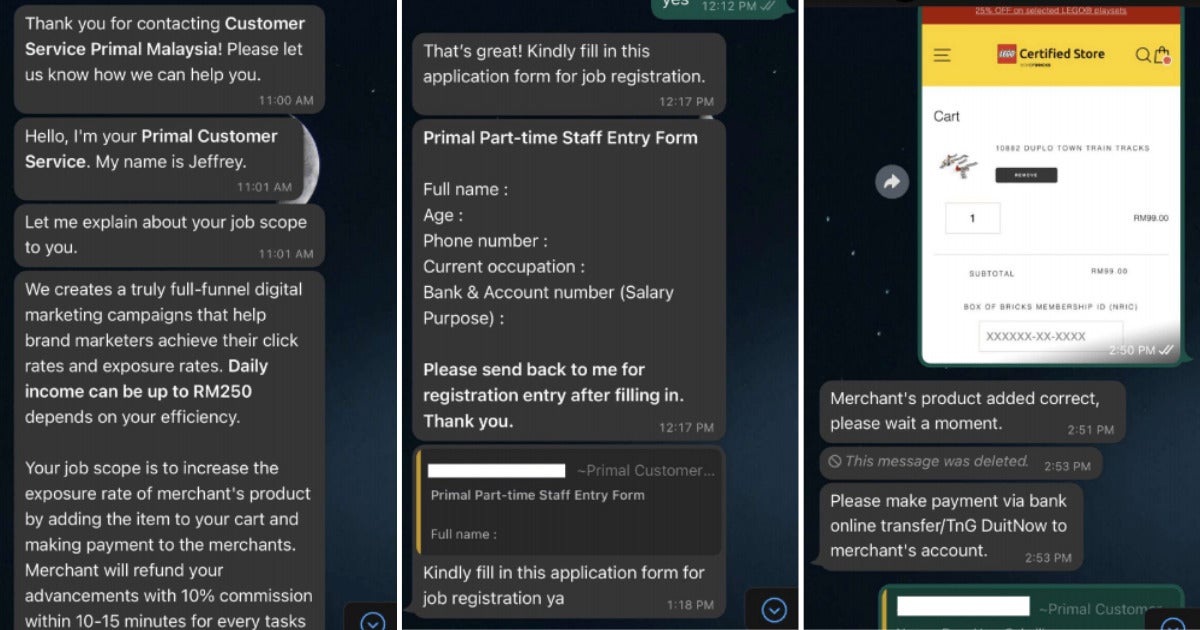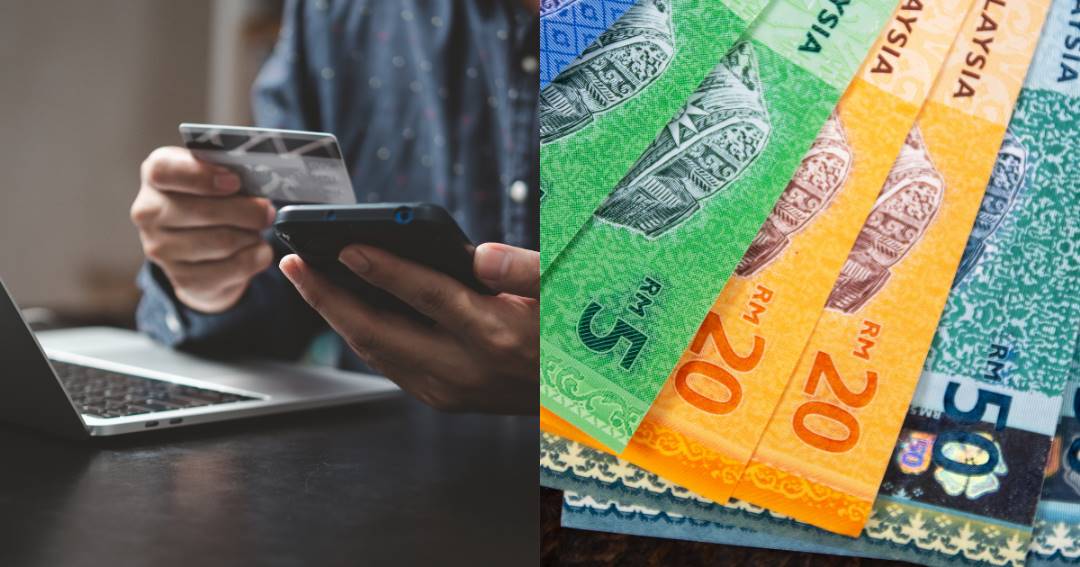Disclaimer: In Real Life is a platform for everyday people to share their experiences and voices. All articles are personal stories and do not necessarily echo In Real Life’s sentiments.
Subscribe to our Telegram for updates.
From 2020 to May 2022, PDRM reported that there were over 71,800 scams which resulted in more than RM5.2 BILLION in losses.
The number of online scams grew very substantially in these two years, likely due to the pandemic.
While there have been thousands of news articles and social media posts warning about online fraud, unfortunately many Malaysians time and time again are still falling for it.
So, here’s a list of the 5 most common online scams Malaysians are still falling for so you don’t become a victim yourself.
1. E-commerce job scams where you supposedly ‘earn’ money back

Having racked up to 9,500 cases in 2021 alone, this is one of the most common yet successful scams in Malaysia.
Modus operandi:
- Scammers will text you saying they’re from a digital company (they use real Malaysian company names to make it more believable).
- They’ll then claim they are helping small merchants on Shopee/Lazada to boost their ratings. All you have to do is buy an item through a link they will send, then they’ll refund you the money with a 10% commission.
E.g. If you buy a chair for RM100, they’ll pay you RM110. - The trick is, they’ll refund you the first purchase to make you believe them. But they won’t refund you the next purchases until you realize it’s a scam.
You can read a real-life recount from a victim here.
2. The notorious Macau Scam that gets you to change your bank pin number

Another old yet recurring scam method, it is still used by many scammers today.
Modus operandi:
- Scammers will call you claiming to be from a ____ bank. (Can be Maybank, CIMB etc)
- They’ll ‘inform’ you that a transaction of RMXXX payment has taken place from a credit card under your name.
- Regardless of whether you have a bank account from that specific bank brand, they’ll tell you that this could be a “suspicious transaction” and your “personal details” may have been stolen. The idea is to cause you to panic.
- They’ll then ‘transfer’ the call to “Bank Negara Malaysia” to assist victims in making a “police report”.
- Then, the call would be transferred to their official “police station”, where a fake “police inspector” will ask you for your bank account details.
- The scammers will then ask you to quickly go to your nearest ATM and change your pin to a new 6-digit pin that they’ve provided.
- After that, with the bank details and new 6-digit pin, the scammers will empty out your bank account in less than a few minutes.
You can read a real-life recount from a victim here.
3. Fake service scams that’ll trick you into giving away your personal details

This one is harder to detect for those who are not wary!
Modus operandi:
- Scammers will put up fake digital ads all around social media. It can be cleaning services, product links etc.
- When you click on the ad, you’ll be redirected to a fake online transaction site where it’ll ask you to input your bank details like credit/debit card number and security number for the payment.
- Upon doing so, the scammer would then have a record of your details and subsequently use it to purchase items or credits to be converted into cash for themselves.
You can read a real-life recount from a victim here.
4. Investment scams that lure you into putting in more money

In this era of get-rich-quick mentally, investment scams have been dreadfully successful at targeting not just young adults, but elderly kampung folks who just want more pocket money to get through their day-to-day life.
Modus operandi:
- Scammers will show you their successful portfolio of XX% return on investments.
- For the first few months, they will make careful day trades where you will see real returns from your investments.
- You’ll then invest more money into the account hoping to get bigger returns as well.
- After a few months when the scammers accumulated a big enough pool of people and their money, they will then abscond with everything.
Alternatively, sometimes the scam will ask you to deposit money in order to withdraw the earnings.
You can read a real-life recount from a victim here.
5. Dangerous phishing links that hack your phone or laptop

This is probably one of the scariest as it could happen to any of us.
Modus operandi:
- Scammers will send phishing links to you in all sorts of different ways.
E.g. pretending to be your friend and asking you to ‘check out this leaked video of yourself’, an email that claims your account has been hacked and you should change your password right away etc. - When you click on these links, it will cause your phone to download malware or virus which then spies on your activity or collect confidential data through your device, such as your bank login details.
- The scammers will then empty out your bank account immediately.
You can read a real-life recount from a victim here.
Checklist on how to avoid falling prey to such scams

Unfortunately, as time progresses, online scams are always evolving to get new victims. So what can we do as individuals to keep ourselves safe? Here’s a few pointers as a rule of thumb to follow by:
- If something is too good to be true, it usually is. People tend to fall into scams because they are seduced by the hope of being able to earn good money. So don’t trust it!
- Keep calm and refer to an official website/number. Scammers try to induce panic so you cannot think logically for those few minutes. If a scammer informs you of a seemingly dangerous crisis (e.g. bank account is hacked, child is kidnapped etc), remember to keep calm and report the matters to the police. Don’t use the numbers or people they ‘refer’ to you.
- Double check names and email addresses. Phishing links usually come from emails that look legit but aren’t. E.g.: they’d often use a @gmail or fake URL like @maybank-official to try to persuade you into thinking they’re real.
With that in mind, you can safely navigate through these horrible liars who try to con you out of your money, or worse, life savings.
Be safe on the internet! Share this to your loved ones and make sure that they, too, stay away from danger.
Do you have a personal story to share? Email us at ym.efillaerni@olleh
For more stories of scammers in Malaysia, read:
This Scam Targets Malaysians With Facebook Accounts, Are You Affected?
You might also like
More from Real Skills
How I Saved Almost RM50,000 On Buying My First Car
Here's how this Malaysian man with a RM3,500 salary saved RM50,000 on his first car.
Angry M’sian Boss Demands Unpaid Overtime Over Raya, Causes 9 Staff To Quit
An anonymous employee at a local SME shares how a bad-tempered boss eventually caused 9 staff to quit before Hari …
I Studied In Chinese School As A Malay Boy, Here’s What I Learnt
Every time I used Mandarin outside of school, family members would come up to me at gatherings and ask me …


















